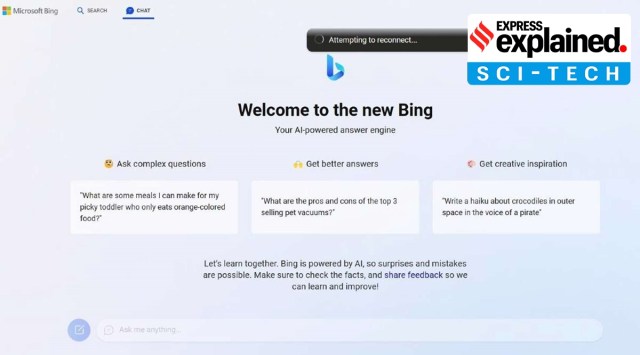Latest Comment
Post Comment
Read Comments
 Bing’s AI chat experience will certainly make it feel more like ChatGPT. Users will be able to ask “follow-up questions,” as well to their earlier question. (Image: Screenshot from Bing)
Bing’s AI chat experience will certainly make it feel more like ChatGPT. Users will be able to ask “follow-up questions,” as well to their earlier question. (Image: Screenshot from Bing)The future of search will be different. That’s what was clear after Microsoft’s surprise AI event last night in collaboration with OpenAI, the tech startup behind ChatGPT and Dall-E. At the event, Microsoft announced plans to integrate its Bing search with more artificial intelligence (AI) features, powered by a new and bigger language learning model (LLM) from OpenAI. Based on what Microsoft showcased, Bing search will be more conversational and interactive, almost like a smart AI assistant, rather than just showcasing endless links – which is the case right now. Let’s take a look at what Microsoft announced and why this comes at a critical time
Bing’s new avatar will allow the search engine to give more conversational answers, in the form of essays and summaries. Yes, it will still show links, but also give a “summarised answer” on the right, which is based on “consolidating reliable sources across the web,” according to Microsoft’s blog post.
Based on the demos, Bing’s new chat experience will also write poems, and stories and even give tips on what to do in a particular city, all designed to make search seem more personalised. But keep in mind this is still a limited release and users have to sign up on the waitlist in order to get access. The Bing search experience once it starts rolling out will be available on the desktop and the respective apps.
Well not exactly. For one, Microsoft’s Bing Search will continue to show links, even in those essay-style answers – the links are shown at the bottom of these answers. ChatGPT does not show links at the moment. But it would be fair to say Bing is getting a lot of help from OpenAI and the large language models (LLM) that helped create ChatGPT.
Microsoft’s blog post notes that the LLM powering Bing is bigger than what is being used to run ChatGPT, though exactly how big is not specified. This also means Bing’s AI chat will have more answers and a larger knowledge pool compared to ChatGPT – where the knowledge is limited to events before 2021.
But Bing’s AI chat experience will certainly make it feel more like ChatGPT. Users will be able to ask “follow-up questions,” as well to their earlier question.
The new AI features also apply what Microsoft is calling a “Prometheus model”. Microsoft calls this a “proprietary way of working with the OpenAI model” that ensures it can utilise these language models in the best possible manner to give “relevant, timely and targeted result…”
Microsoft has cautioned that not all answers will be accurate given these features are still in early preview. Bing search will also let users flag an answer as incorrect if needed which will help in feedback. The company admits that since the answers are based on knowledge from the web, they might not be accurate and have asked users to rely on their own judgement when using these AI-based answers. At the end of the day, many of the AI chat’s responses are based on knowledge which has been sourced from the web, some of which could be wrong.
The post adds that Bing search experience is designed “to keep humans at the centre, and we have developed a safety system that is designed to mitigate failures and avoid misuse with things like content filtering, operational monitoring and abuse detection, and other safeguards.” That’s also why the feature is being rolled out in a phased manner.
It is too early to say, but no doubt Microsoft’s announcement and the viral interest around ChatGPT likely has Google worried. In fact, even Google announced its own rival to ChatGPT called Bard earlier this week. It is also hosting an event on AI in Paris later tonight where it will showcase some new AI products. More details about Bard are also expected at this event. Google has also promised to bring more AI-based features to search.
Still, it is fair to say Microsoft has taken the lead in AI-related developments and its announcement will have big implications for Bing. Bing has never been as popular as Google search – the latter has thoroughly dominated the search market for decades. But with AI-features which give exact, precise and interesting answers, the nature of how people will search is bound to change. And if Bing and OpenAI continue to improve and scale faster, then Google could be in serious trouble.


